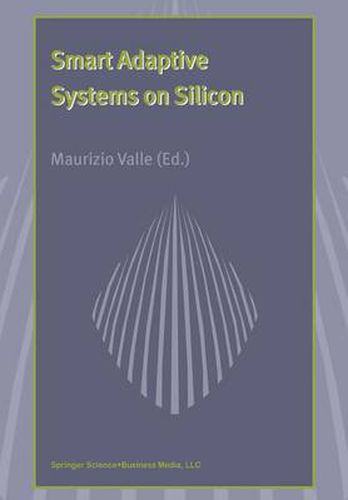Readings Newsletter
Become a Readings Member to make your shopping experience even easier.
Sign in or sign up for free!
You’re not far away from qualifying for FREE standard shipping within Australia
You’ve qualified for FREE standard shipping within Australia
The cart is loading…






This title is printed to order. This book may have been self-published. If so, we cannot guarantee the quality of the content. In the main most books will have gone through the editing process however some may not. We therefore suggest that you be aware of this before ordering this book. If in doubt check either the author or publisher’s details as we are unable to accept any returns unless they are faulty. Please contact us if you have any questions.
Intelligent/smart systems have become common practice in many engineering applications. On the other hand, current low cost standard CMOS technology (and future foreseeable developments) makes available enormous potentialities. The next breakthrough will be the design and development of smart adaptive systems on silicon i.e. very power and highly size efficient complete systems (i.e. sensing, computing and actuating actions) with intelligence on board on a single silicon die. Smart adaptive systems on silicon will be able to adapt autonomously to the changing environment and will be able to implement intelligent behaviour and both perceptual and cognitive tasks. At last, they will communicate through wireless channels, they will be battery supplied or remote powered (via inductive coupling) and they will be ubiquitous in our every day life.
Although many books deal with research and engineering topics (i.e. algorithms, technology, implementations, etc.) few of them try to bridge the gap between them and to address the issues related to feasibility, reliability and applications. Smart Adaptive Systems on Silicon, though not exhaustive, tries to fill this gap and to give answers mainly to the feasibility and reliability issues.
Smart Adaptive Systems on Silicon mainly focuses on the analog and mixed mode implementation on silicon because this approach is amenable of achieving impressive energy and size efficiency. Moreover, analog systems can be more easily interfaced with sensing and actuating devices.
$9.00 standard shipping within Australia
FREE standard shipping within Australia for orders over $100.00
Express & International shipping calculated at checkout
This title is printed to order. This book may have been self-published. If so, we cannot guarantee the quality of the content. In the main most books will have gone through the editing process however some may not. We therefore suggest that you be aware of this before ordering this book. If in doubt check either the author or publisher’s details as we are unable to accept any returns unless they are faulty. Please contact us if you have any questions.
Intelligent/smart systems have become common practice in many engineering applications. On the other hand, current low cost standard CMOS technology (and future foreseeable developments) makes available enormous potentialities. The next breakthrough will be the design and development of smart adaptive systems on silicon i.e. very power and highly size efficient complete systems (i.e. sensing, computing and actuating actions) with intelligence on board on a single silicon die. Smart adaptive systems on silicon will be able to adapt autonomously to the changing environment and will be able to implement intelligent behaviour and both perceptual and cognitive tasks. At last, they will communicate through wireless channels, they will be battery supplied or remote powered (via inductive coupling) and they will be ubiquitous in our every day life.
Although many books deal with research and engineering topics (i.e. algorithms, technology, implementations, etc.) few of them try to bridge the gap between them and to address the issues related to feasibility, reliability and applications. Smart Adaptive Systems on Silicon, though not exhaustive, tries to fill this gap and to give answers mainly to the feasibility and reliability issues.
Smart Adaptive Systems on Silicon mainly focuses on the analog and mixed mode implementation on silicon because this approach is amenable of achieving impressive energy and size efficiency. Moreover, analog systems can be more easily interfaced with sensing and actuating devices.